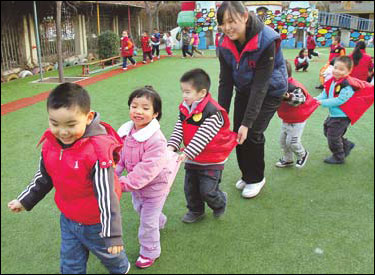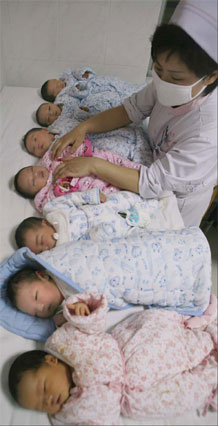Society
Brides and prejudice in China
By He Na (China Daily)
Updated: 2010-08-23 08:03
 |
Large Medium Small |
|
|
China's widening gender gap threatens to cause "irreversible" damage to the traditional family unit and could lead to more women being abducted, trafficked or sold into marriage, experts have warned.
The disparity between the number of male and female babies born across the country has been steadily increasing since the 1980s. Studies by the National Population and Family Planning Commission this year showed the imbalance of men and women is 130 to 100 in provinces such as Anhui, Jiangxi and Shannxi, according to Yuan Xin, a professor at Nankai University's population and development research institute.
|
|
Analysis of the under-19 age group by the Chinese Academy of Social Sciences also suggests that, by 2020, there will be 24 million more men of marriageable age (roughly 19 to 45) than women.
"The effect of the gender imbalance may not be obvious yet," said Yuan. "But if we don't take measures to narrow the gap now, the accumulated effects will lead to irreversible problems for society."
The country has already entered an era where men far outnumber women, he said, "so if in 10 years the media is reporting about tens of thousands of men who can't find wives, then it will be no joke".
A single man in his mid-20s is considered young in the city, yet in rural areas, where traditional ideas remain strong, it is thought to be dangerously old.
"I just want to get married as soon as possible as I'm already fed up with the gossip of relatives and neighbors," said Li Lei, a 25-year-old bachelor in Mishan county, Heilongjiang province. "In their minds, if a man my age is single he must have some physical defects."
Li, who is of medium height and build, works at his family's shop selling bedclothes. Although far from being rich, he and his parents enjoy a relatively comfortable life.
"Most of the girls in my village study or work away and the chance of them coming back here to live is very slim," he said. "I've dated women from outside of the village but none of them agreed to marry me. They either treat my family like a goldmine and asked for a large dowry or thought I am too poor."
Family comes first
The shortage of women has led to soaring numbers of unmarried men in their late 20s in China's countryside, particularly in poverty-stricken regions, said professor Yuan.
"It is not a hypothesis. I have visited some remote villages in Guizhou province and the Guangxi Zhuang autonomous region where most of the men are single," he said. "It is common to see elderly men who have never married."
Chinese people attach great importance to the concept of family. One of many maxims on the subject goes: "Harmony in the family is the basis for success in any undertaking".
Experts warn that the gender gap not only threatens social stability but could also put more women in danger.
"The sharp rise in the number of men of marriageable age who fail to find wives will become a big hazard," said Tian Xueyuan, deputy director of the China Population Association. "It will increase incidences of women being bought as wives, as well as abduction and trafficking, and prostitution and pornography."
Public security officials in East China's Zhejiang province last year investigated about 200,000 marriages involving women from other parts of the country. It was discovered almost 36,000 of the brides were kidnapped from comparatively under-developed provinces, such as Yunnan, Guizhou, Sichuan and Hubei.
Many men also resort to importing potential wives from overseas, otherwise known as "mail-order brides".
Wang Cheng, a 26-year-old living in Tonghe, a remote county, in Heilongjiang, said he paid 58,000 yuan ($8,500) to a matchmaking agency to be introduced to a woman from Vietnam. The couple was quickly engaged and married in late April this year, much to the joy of Wang's parents.
However, the wedded bliss was short-lived and one week later the Vietnamese bride disappeared without a trace.
About 100 farmers have reported similar cases to the provincial authorities, said Wang, although no action can be taken because it is legal for foreigners to marry in China as long as they have valid visas.
Under the law, however, husbands of the missing brides cannot re-marry until the women return to finalize divorce proceedings.
"This problem with Vietnamese brides has been going on since the early 1990s," said Tian. "The authorities have enhanced their management (of the practice) in recent years but there are still many fraud cases being reported.
"The idea of importing brides to solve the shortage in women may work in countries with lower populations but in a huge country like China they are just a drop in the ocean. It's not a realistic solution," he added.
But it is not only families that are being affected by the imbalance, so too is the job market, said Yuan at Nankai University.

"This could prove a heavy blow," he explained. "Many textile factories in coastal cities have already shut down or turned to other industries because of the shortage in female laborers."
The increase in male workers, some of whom are taking positions traditionally held by women, puts extra pressure on women looking for jobs, he added.
Although the effects of the gender gap could be numerous, analysis suggests the cause can largely be traced to Chinese people's deep-rooted preference for boys.
Figures from the National Bureau of Statistics of China show the ratio of infant boys to girls was 108 to 100 in 1982, rising to 111 in 1990, 119 in 2000 and 120 in 2005. At the time of the national population census five years ago, 99 cities had a ratio of more than 125 boys to every 100 girls.
Reliance on boys
Despite government efforts to promote equality, many Chinese parents still consider male heirs more important as they believe they are more capable of supporting them in later life than girls. Boys also carry on the family line, as children traditionally take their father's name.
"I've been pregnant for nearly three months and I don't care whether it's a boy or a girl," said Dong Jiaomei, 29, a teacher at Dalian Polytechnic University in Liaoning province. "But because my husband is an only child, my parents-in-law are desperately hoping I have a boy.
"My husband and I have talked to them about this many times but their minds are rooted in the concept. They say that as long as I give them a grandson, I will be the most important person in the family," she added.
The preference for boys is especially strong in impoverished areas, where families tend to have two or three children.
Wang Shuzheng, who lives in Wangzhuangtou village in Hebei province, has two daughters aged 19 and 7, and a 2-year-old son. He said he paid more than 20,000 yuan in fines to family planning officials in order to ensure he had a male heir.
"I don't have any social insurance to take care of me in later life," said the 39-year-old father. "My daughters will get married and join other people's families one day, so my wife and I can only rely on my son when we are old. Although the money (paid in fines) is almost the same as our family's income for an entire year, it was worth it."
Sociologists suggest the desire to have male children is also the result of a history of sexual discrimination in the country, with a level of inequality remaining even today.
"Women still take on most of the housework and raise the children," said professor Yuan. "Men still take the majority of the leading roles in government organs."
Chinese society has had a preference for male heirs for more than 1,000 years, yet the reason the imbalance has grown over the last 30 years is due to the high number of illegal "sex-selection" abortions by back-alley doctors since the 1980s.
In July, police in Zhejiang's Sanmen county raided an underground clinic that offered ultrasound services. Doctors are banned from revealing the sex of an unborn child in China.
Detectives said more than 1,000 women had received abortions there, many of them shortly after discovering their baby was a girl.
"Illegal abortions not only leads to a gender imbalance in the county but also directly threaten the lives of pregnant women," said Zhang Wenbiao, director of Zhejiang Family Planning Commission. "The clinic (that was raided) had already caused the death of one woman and two infants due to its poor conditions. The doctors were also practicing with fake qualifications."
Banning the scans
According to a 2005 government-backed study of 1 percent of the population, the ratio of boys to girls increases considerably depending upon how many children are in a family - the first child being 108.4 boys to every 100 girls, the second 142.2, and the third 152.8.
"In some villages, no second child born into families in the past three years has been a girl. Of course, it is work of illegal (ultrasound and abortion) clinics," said Yuan.
The professor urged the government to draw up special regulations to deal with illegal "sex-selection" surgeries and include the crime of fetal gender identification under the Criminal Law.
South Korea, which has encountered a similar problem, has introduced strict penalties against staff working at back-alley ultrasound and abortion clinics, including a maximum fine equivalent to 200,000 yuan and three years in prison, according to professor Yuan.
"Only with tough punishments and the support of law, will illegal gender identification and abortions be effectively curbed," said Yuan.
The National Population and Family Planning Commission has been promoting equality since the 1990s, helping to change attitudes towards girls through education and offering work opportunities. Officials say it has made a huge difference in many regions.
However, to better solve the growing imbalance, Yuan suggests the government improve its welfare services, such as social and medical insurance systems in the countryside, as soon as possible,
"That way, it will reduce the need for a male heir to support his parents," he said. "If people feel financially secure in later life, the concept of men being better than women will disappear naturally."
|
|


